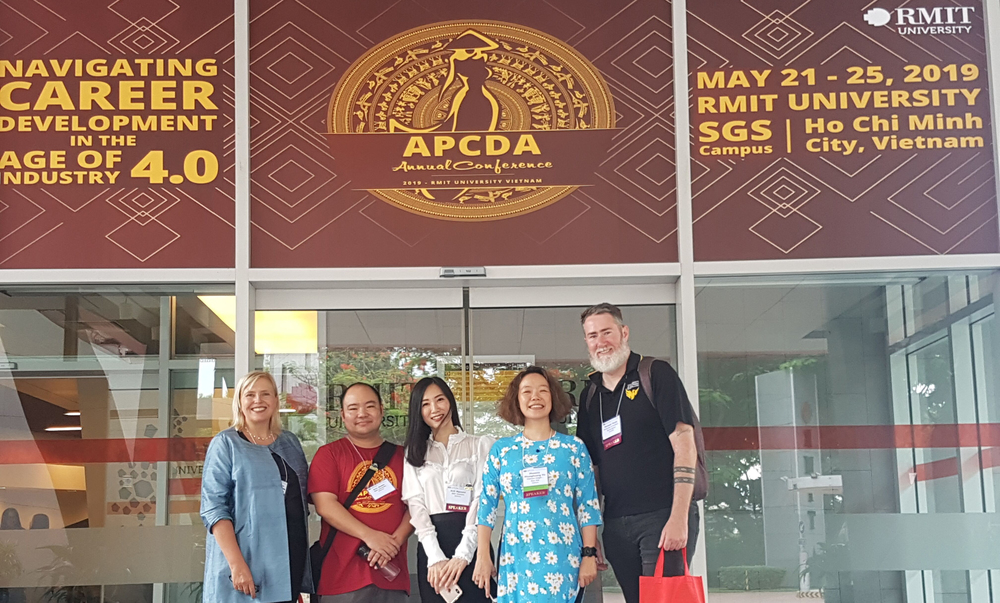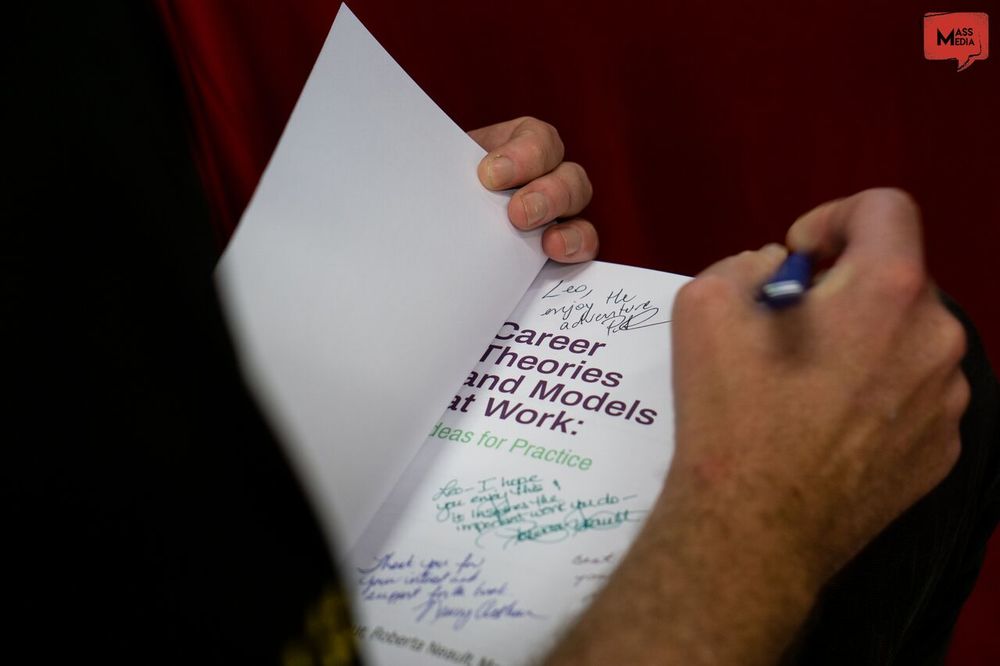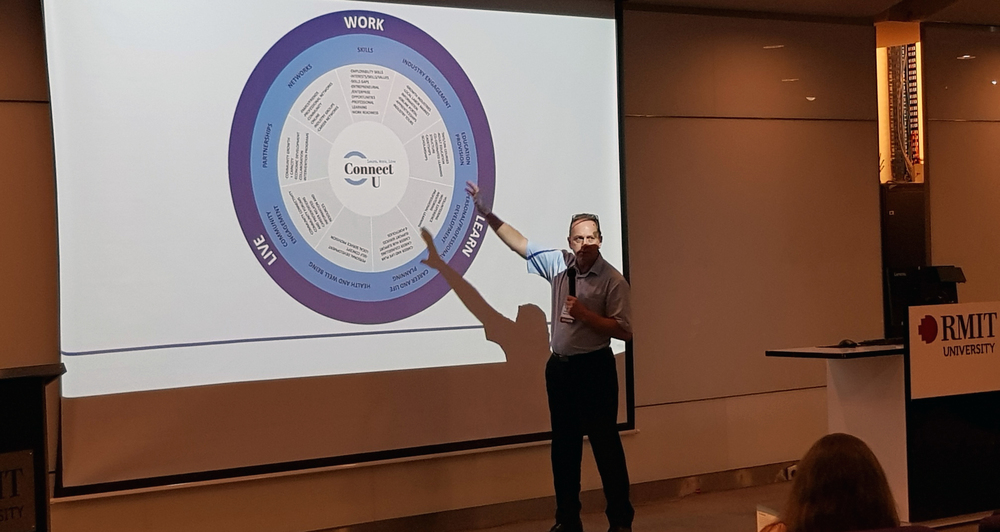Experiences and Learnings from the 2019 APCDA Annual Conference
12/06/19
CDAA Conference Grant Recipients Michael Healy and Alan Davies recently attended the 2019 APCDA Annual Conference. The conference was held in May, 2019 in Vietnam with the theme of Navigating Career Development in the Age of Industry 4.0. This article explores their experiences and learnings at the conference.

Ho Chi Minh City
Michael Healy
In May 2019, I attended the Asia Pacific Career Development Association Conference held at RMIT University in Hoc Chi Minh City. I am grateful for the generosity of the CDAA who supported my attendance in the form of an international travel grant. For me, this was no ordinary overseas conference, as Vietnam was home to me for five years.
I lived in Vietnam from 2010 until 2015. I met my wife in Vietnam and my son was born there. Although it’s been more than four years since we moved to Australia, the culture, language, and food of Vietnam still surrounds me.
Vietnam is also where I started my career in careers. I started at RMIT VN as an English teacher, but took an opportunity to transfer to the careers centre. Initially, I was hesitant and uncertain, because I didn’t understand the work. I soon realised the deeply transformational learning that can happen in career education and knew I had found my calling.

Photo courtesy of the author. L-R: Felicity Brown, Eric Asato, Anh Nguyen Ngoc (RMIT Vietnam), Phoenix Ho (Hon Viet Institute), Michael Healy (USQ)
Aside from my personal connection to Vietnam in general and RMIT VN in particular, my attendance at APCDA 2019 was a highlight of my career to date, for several key reasons:
1. I can’t go without mentioning the book signing for Career Theories and Models at Work: Ideas for Practice, a novel new experience for me. This is a book that makes a diverse range of theories accessible for careers practitioners. To be included in it as an author is an honour and the enthusiastic reception it received at APCDA was gratifying and humbling.

Photo used with permission, courtesy of RMIT Mass Media Club SGS
2. Happenstance happens.
Just prior to the conference, the news came out of Professor John Krumboltz’s passing. Krumboltz was the author of the planned happenstance theory, and when delegates enjoyed those seemingly random meetings and coincidences, we often paused to honour the truth of his work. One evening, after a long day at the conference, my colleagues and I piled into the back row of a shuttle bus back to the hotel and struck up conversation with Candy and John, delegates from Canada. Within minutes we had made arrangements for a shared Saigon street-food dinner and struck up personal and professional friendships. We’re hopeful that we’ll be have an opportunity to meet again at some academic conference or another, or collaborate on a research project. When we do, we’ll toast that chance meeting in a bus’s back seat.
3. It’s important to broaden your horizons
I have only worked in higher education, and only in two countries (one, really, if you consider the fact that RMIT VN is an Australian satellite campus). It’s important for me to remember how slim that slice of career development life is. I wouldn't normally seek out information on youth work in Hong Kong, vocational education in Taiwan, international students in America, employment services in Korea, stakeholder engagement in Qatar, or workforce planning in Singapore, but at APCDA I enjoyed the exposure to a much more diverse range of career development contexts.
I’ve often noticed APAC career practitioners’ interest in Australian research and practice, at conferences like CDAA and NAGCAS. But if we in Australia don’t in return pay attention to what our neighbours are doing, we risk missing out on some truly innovative and inspiring developments.
We also risk paying lip service to diversity if we don’t make efforts to learn from our nearest neighbours. Take the work of my former RMIT colleague and mentor, Phoenix Ho. Pheonix is tackling the shortage of qualified career development professionals in Vietnam by training and mentoring teachers and consultants as they develop Vietnamese career education and guidance from the ground up. Phoenix is doing this not simply by translating Western theories and tools into Vietnamese, but supporting her students to develop Vietnamese models and theories.
In 2020 the APCDA conference will be in New Dehli, in 2021 it will be in Singapore, and in 2022, Azerbaijan. I strongly encourage all Australian career development practitioners to plan to attend the conference and enjoy the kind of experience I had in Vietnam.
Alan Davies
Employment Challenges facing Regional Communities around the Asia Pacific.
Having recently returned from attending and presenting at the APCDA conference in Ho Chi Minh City, Vietnam, I have had the opportunity to reflect on a number of the different presentations that focused on the challenges facing different countries in addressing the shift of young people from regional communities to the cities.
It was evident that the decline of jobs in traditional industries and the changing global economy have impacted heavily on smaller regions to compete with employment opportunities in the larger cities. A number of different approaches were presented throughout the conference with a clear focus on improving access to career counselling and career development programs and resources to support young people better identify with local employment options and to gain the education and skills to fulfil these roles in regional communities.
It was interesting to note that presenters from Japan, Singapore and Manilla also identified with many of the current employment issues faced in regional communities across Australia. Koji Matsuo a career counsellor in Japan highlighted the rapid decline of youth in regional communities which has led to continued growth of the population of Tokyo at the expense of the smaller country towns.
Many of the traditional employment opportunities in agriculture and fishing are declining across Japan which has led to more people looking to the major cities for work. We have witnessed this in Tasmania where mining, forestry and manufacturing are diminishing leaving many to contemplate moving to the mainland to seek work. In addressing this, Tasmania has made a concerted effort to promote the growth of hospitality, tourism and aquaculture as future options for young people and have supported this through the introduction of new training courses and promotion of these industries.

Alan Davies presenting at the 2019 APCDA Annual Conference
My presentation at the conference focused on how as communities we can work in a more collaborative way to provide support for young people to navigate their way towards a career which aligned better with their interests, skills and values. The Connect U initiative that is being piloted in the north west region of Victoria looks to introduce an approach that will hopefully provide a platform that will support young people gain a better understanding of the career opportunities within local industries and to better align their education and training towards employment in areas where there are skill shortages. This initiative grew out of the identification of the lack of career support services provided in rural areas for young people to access the necessary information they required before making decisions about their careers. Having a better understanding of local industries, where skill shortages were in local businesses and the educational requirements of different jobs were all identified as key to building a strong local workforce into the future.
This was supported by a contingent of career counsellors from Singapore who presented on the topic of "It takes a village" and the model they have developed to ensure career support is provided across their regional communities to find solutions to their workforce issues. The adoption of a multi agent model whereby career counsellors have been employed across their country in addressing the workforce challenges of this small nation. They have made a concerted effort to focus their limited resources on developing a strong team of certified career practitioners that deliver career related programs and services in regional areas which is having an immediate impact on the employability and work readiness of young people in these communities.
Overall, the conference was valuable in gaining a broader perspective of the challenges faced in supporting people to navigate their way towards employment and reinforced the importance of how career counselling services will continue to play a major role in shaping the workforce and overcoming challenges for employers into the future..
To gain a better insight into the Connect U initiative, I would like to invite you to visit our site at: https://www.swanhillconnectu.com.au